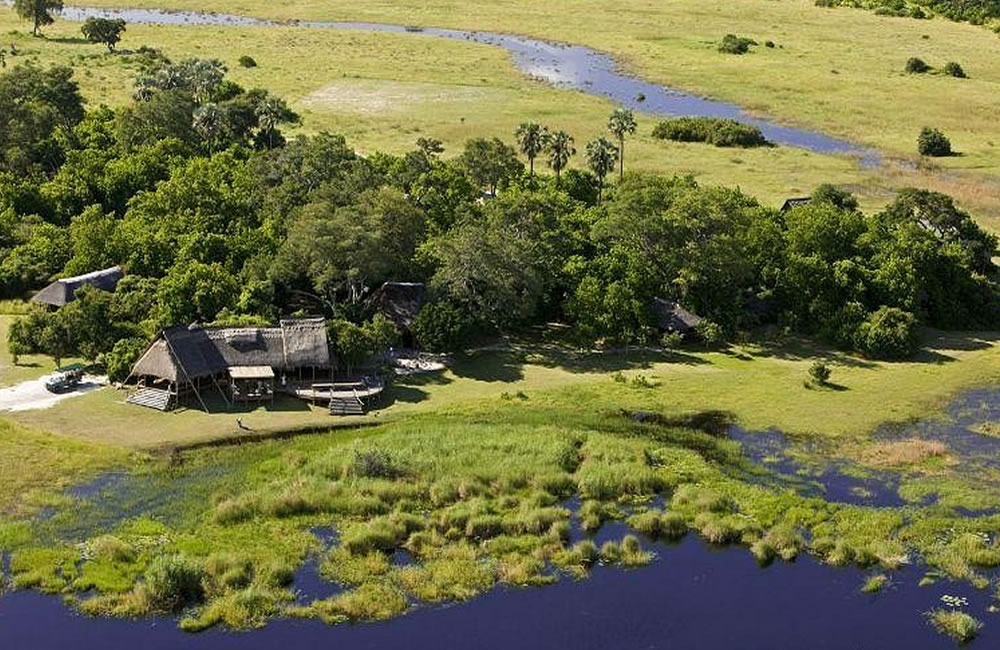Almost an hour by plane to the north-east of Botswana’s legendary Okavango Delta, close to the borders with Namibia, Zambia and Zimbabwe, lies an African conservation legend… The Selinda Reserve.
It’s hell-hot as the build up to the annual rains reaches its height, reducing the area to nothing more than a loose collection of permanent pools and lagoons dotting an otherwise parched landscape. And yet life is abundant here, and the dusty road to Selinda Camp is littered with amazing game sightings.
Guide Motsamai “Mots” Morundu marvels at how the resident wildlife copes with the heat and tells me about the success story we are traversing over.
Little more than a decade ago, this area was still home to a hunting concession before Great Plains Conservation, headed up by wildlife filmmakers extraordinaire Dereck and Beverly Joubert, took it under its wing – and introduced the concept of sustainable development, community engagement and conservation through low-impact, high-end tourism.
Mots has worked with Great Plains since it began, and sums up the concept very nicely: “it’s about making sure that what we have now, here, is valued by everyone and can be enjoyed by my children, their children, and their children’s children,” he says. “It’s not just about recycling, reducing energy and being green – it’s about being beneficial to everyone involved in it – whether you are an animal or a person,” adds Mots.
Selinda Camp, and its sister properties on the reserve – Zarafa and Selinda Explorer’s Camp – are recognised by Fair Trade Tourism, Africa’s leading sustainable tourism organisation, through its partnership with the Botswana Tourism Organisation‘s Ecotourism Certification Programme. This means that guests staying on the reserve can rest assured that their holiday spend is making a real and lasting difference to both conservation and communities.
Koketso “Koki” Mookodi is the community liaison officer for Great Plains Conservation. “For us here on the Selinda Reserve, and across all of the camps we operate, conservation underpins our business,” she says. “It’s vitally important that we equip young people with conservation knowledge and an understanding of the role that tourism plays in helping to protect our environment,” Koki explains.
“We have adopted two villages on the Delta’s panhandle – Seronga and Gudigwa – and have rolled out a conservation education programme in their schools to complement the work of the conservation clubs,” says Koki. “Through this programme the children have become conservation ambassadors, teaching their entire communities on the importance of protecting wilderness areas and the wildlife that call them home. They are also champions of our Big Cat Initiative and Rhinos Without Borders campaigns.”
The big question seems to be: “does sustainability really matter to tourists?” For Americans Celsea and Wyatt Jenkins it most certainly does. They are among a growing number of international travellers who choose to live sustainable lifestyles and select their destinations based on how sustainable they are.
“We travel widely and make a point of engaging in authentic, local experiences which benefit communities no matter where we are in the world,” explains blogger and fitness guru Celsea. “We live in San Franciso and use solar energy, recycle, give to community programmes and try to live as consciously and sustainably as we can. So it makes sense for us to choose our holidays based on how sustainable they are.”
Business developer Wyatt reinforces his wife’s viewpoint by saying that he is particularly conscious of where their holiday spend ends up. “We need to know where the money goes and feel comfortable with the footprint we leave behind us,” he says. “There has never been a greater need for sustainability in everything we do. Communities and people need to feel the benefit of tourism in places as remote and wild as this in order to see the value of protecting them for future generations.”
The sun is setting, and a breeding herd of elephants files silently past Selinda Camp, silently reinforcing the sentiments of all concerned.
Your travel choices can help to change the world, so remember to choose wisely!
More about Selinda Camp and Fair Trade Tourism
For more information on Selinda Camp, visit www.greatplainsconservation.com. For more information on Fair Trade Tourism and sustainable tourism destinations in Africa, visit www.fairtrade.travel or download the Fair Trade Traveller app free from the Apple App Store or the Google Play Store.

Leave a Reply